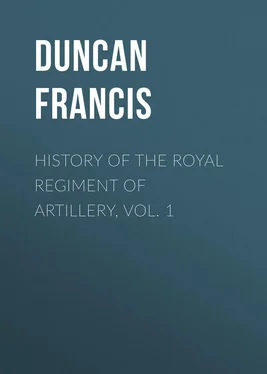Francis Duncan - History of the Royal Regiment of Artillery, Vol. 1
Здесь есть возможность читать онлайн «Francis Duncan - History of the Royal Regiment of Artillery, Vol. 1» — ознакомительный отрывок электронной книги совершенно бесплатно, а после прочтения отрывка купить полную версию. В некоторых случаях можно слушать аудио, скачать через торрент в формате fb2 и присутствует краткое содержание. Жанр: foreign_antique, foreign_prose, на английском языке. Описание произведения, (предисловие) а так же отзывы посетителей доступны на портале библиотеки ЛибКат.
- Название:History of the Royal Regiment of Artillery, Vol. 1
- Автор:
- Жанр:
- Год:неизвестен
- ISBN:нет данных
- Рейтинг книги:4 / 5. Голосов: 1
-
Избранное:Добавить в избранное
- Отзывы:
-
Ваша оценка:
- 80
- 1
- 2
- 3
- 4
- 5
History of the Royal Regiment of Artillery, Vol. 1: краткое содержание, описание и аннотация
Предлагаем к чтению аннотацию, описание, краткое содержание или предисловие (зависит от того, что написал сам автор книги «History of the Royal Regiment of Artillery, Vol. 1»). Если вы не нашли необходимую информацию о книге — напишите в комментариях, мы постараемся отыскать её.
History of the Royal Regiment of Artillery, Vol. 1 — читать онлайн ознакомительный отрывок
Ниже представлен текст книги, разбитый по страницам. Система сохранения места последней прочитанной страницы, позволяет с удобством читать онлайн бесплатно книгу «History of the Royal Regiment of Artillery, Vol. 1», без необходимости каждый раз заново искать на чём Вы остановились. Поставьте закладку, и сможете в любой момент перейти на страницу, на которой закончили чтение.
Интервал:
Закладка:
The name of the Lieutenant-Colonel in 1727, one we have already met with, and who had seen much service, was Jonas Watson. That of the Major was James Petit. He also had seen considerable service; but neither of them in that respect could approach the brave and experienced officer to whom the command of the Regiment was given by George I., in 1722, and emphatically renewed by George II., in 1727, the celebrated Albert Borgard.
CHAPTER VIII.
Albert Borgard
Not a statesman, not over-refined, and no scholar, a mere soldier of fortune – yet brave, and honest, and true – Albert Borgard deserves more than a passing notice in a history of the Regiment which he was the first to command.
He was by birth a Dane. Born in 1659, he commenced his life as a soldier when sixteen years of age, and until the day of his death, on the 7th February, 1751, at the age of ninety-two years, he never had a thought beyond his profession and his duty. The diary appended to this chapter gives in his own words the best summary of his career which can be written. For naïveté and modesty, it can hardly be surpassed. The compression into two or three lines, of events on which most men would enlarge with effusion; and the simple narrative of wounds and hardships, as if such were the ordinary circumstances of war, and unworthy of special comment, cannot fail to strike the most superficial reader. The only sentence that gives us pain is the plaintive allusion to one who supplanted him with the Board of Ordnance, as Consulting Artilleryman and Engineer. He was so devoted to his profession, that anything which looked like putting him on one side hurt him beyond expression. There is a time in the lives of many active men, when they realize painfully that others are growing up who can outstrip them in work, or who have modern ideas and appliances which it is now too late for them to learn. The pain of such a discovery is, perhaps, the most acute that a man can feel.
From that date, Borgard devoted himself to his men. Living in the Warren at Woolwich, constantly among them, he was incessant in urging them to master the details of their profession. Being devoted himself to all laboratory work, his order-books are full of instructions to the cadets and young officers, to devote their leisure to practical lessons in that department. And he encouraged any who might succeed in making any good "Firework" to bring it to him for inspection and approval. He was a strict disciplinarian; and some of the punishments he awarded would astonish modern soldiers. But he was essentially honest, incapable of falsehood or meanness, and if every man in this worthy world were, like him, brave and honest and true, what a Paradise it would be!
He commenced his military career in the service of the King of Denmark. He went from that, in 1689, to the King of Prussia's service; served in Hungary in 1691; and was induced by William III. to join the English service in the following year. At the termination of hostilities he and one other foreigner, named Schlunt, whose name appears in the list of officers of the short-lived regiment of 1698, were the only Artillerymen other than English, who were selected to proceed to England for permanent employment.
In 1702, he went as Major in the expedition to Cadiz, and carried on a successful bombardment with the five bomb-vessels under his command. In the following year he volunteered for service under Marlborough, but, after a few months in Flanders, he was recalled to proceed to Spain with the expedition under Sir George Rooke and the Duke de Schomberg, which escorted the Archduke Charles, who had just been proclaimed by his father, King of Spain. Until the year 1710, he was engaged in all the hostilities which were now carried on in Spain, and of which his diary gives a summary. In 1705, at the siege of Valencia, which was taken by the English under Lord Galway, (who had been appointed to the command in place of Schomberg), he lost his left arm; and in 1710, he was wounded in the leg by a round shot, and taken prisoner.
But his first service with the Royal Artillery, after its existence as a regiment, was in 1719, when he went in command of the Artillery of Lord Cobham's force against Spain, and successfully bombarded Vigo. The troops, 4000 in number, embarked in a squadron of five men-of-war under Admiral Mighells, and coasting from Corunna to Vigo, were landed two or three miles from the town. The garrison of Vigo withdrew to the citadel, spiking the guns in the town; but so heavy and well-directed was the fire of the English, that they soon capitulated.
The whole of the Artillery arrangements, both in preparing and handling the train, had been under Colonel Borgard's sole control. Judging from the entry in his diary, he was far more pleased by the success of his inventions and improvements in the matériel of his train, than by the surrender of the enemy.
As this was the first train of Artillery to which the Royal Artillery Companies were attached on active service, it has been considered desirable to give some details as to its constitution.
First, as to personnel : – It was commanded by Colonel Borgard, assisted by a major, a captain, three lieutenants, and four fireworkers. The medical staff, a surgeon and his assistant, received a little more remuneration than in former trains; their daily pay – which to a modern ear has a very legal sound – being respectively 6 s. 8 d. and 3 s. 4 d. There were seven non-commissioned officers, twenty gunners, forty matrosses, two drummers, and ten artificers. Engineers, conductors, drivers, and clerks were also present; and on account of the particular nature of the service on which the expeditionary force was to be engaged, ten watermen and a coxswain were included among the attendants of the train.
Next, as to matériel : – Borgard selected for his purpose four 24-pounders, four 9-pounders, and six 1½-pounders, brass guns, all mounted on travelling carriages, with a proportion of spare carriages for the first and last, spare limbers for the second, and spare wheels for all. He also took a number of brass mortars, six ten-inch, and two eight-inch, besides thirty Coehorn and twelve Royal mortars. The ammunition comprised 9800 round shot, 180 grape, 3800 mortar shells, 1000 hand-grenades, and 100 carcasses for the ten-inch mortars. Two bomb-vessels, each carrying a thirteen-inch mortar, and with two fireworkers, four bombardiers, and an artificer on board, accompanied the expedition, and were also under Colonel Borgard's command.
The citadel capitulated on the 10th October, 1719, and a large quantity of guns and stores fell into the hands of the English. The first occasion, therefore, on which the Royal Artillery as a Regiment was represented on active service was completely successful. The expedition returned to England in November.
One more incident remains to be enlarged upon ere we leave the gallant officer to tell the story of his own life. In 1716, when attending an experiment at the Foundry in Windmill Hill, where some brass guns were being recast, he was wounded in four places by an explosion which took place, and by which seventeen of the bystanders lost their lives. The accident had been foretold – so the story goes – by a young Swiss named Schalch, who was thereupon invited, after his prophecy was fulfilled, to assist the Board of Ordnance in selecting a suitable place near London where all the guns required for the service might be cast.
Young Schalch's hands were rather tied in the matter; for he was limited to a radius of twelve miles round London. Had this not been the case, it is hardly probable that he would have named as the Depôt for national Artillery Stores, and as the National Arsenal – both of which he must have foreseen the place of his selection would become – a place so exposed as Woolwich. As it was, however, being limited to so small an area, his selection was a natural one for other than the reasons which would first occur to him, as it already had a special connection with Artillery manufactures, and with that Board under whose orders he was to work.
Читать дальшеИнтервал:
Закладка:
Похожие книги на «History of the Royal Regiment of Artillery, Vol. 1»
Представляем Вашему вниманию похожие книги на «History of the Royal Regiment of Artillery, Vol. 1» списком для выбора. Мы отобрали схожую по названию и смыслу литературу в надежде предоставить читателям больше вариантов отыскать новые, интересные, ещё непрочитанные произведения.
Обсуждение, отзывы о книге «History of the Royal Regiment of Artillery, Vol. 1» и просто собственные мнения читателей. Оставьте ваши комментарии, напишите, что Вы думаете о произведении, его смысле или главных героях. Укажите что конкретно понравилось, а что нет, и почему Вы так считаете.












